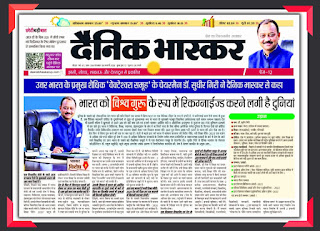CHANGING LIVES WITH DISTANCE EDUCATION PROGRAMS
Shri Venkateshwara University,
Gajraula, Uttar Pradesh, a leading name in the education world and one of the
top universities in North India, offers various diplomas, undergraduate,
postgraduate, and doctorate courses.
Established and led under the leadership
of Dr. Sudhir Giri, a dynamic educationist, philanthropist, entrepreneur,
leader, and humble human being.
Dr. Giri, the chairman of
Venkateshwara Group of Institutions, has set up many schools, colleges, medical
colleges, and universities with an aim of providing affordable education and
healthcare to the masses.
The Directorate of Distance
Education (DDE) offers distance education programs to candidates from every
part of India. DDE offers Bachelors and Masters in Arts, Commerce, and
Management.
Distance learning, also known as
distance education, is a type of education in which there is a physical
separation of teachers and students, and various technologies are used to
enable student-teacher and student-student communication and interaction.
Traditionally, distance learning was
majorly focused on non-traditional students, like full-time working
professionals, military personnel, and non-residents or individuals in remote
regions who could not attend classroom lectures, because of their work.
However, these days, distance
learning has become an integral part of the educational world, as working
professionals are opting for distance learning programs in order to grow and up
skill, without compromising on their work life.
Distance learning has benefitted the
students and the institutions alike.
Educational institutions benefit by
adding students without having to build classrooms and housing, and students
reap the benefits of being able to work where and when they choose, and can
also study side by side.
Modern distance learning courses
make use of Web-based course-management systems that incorporate digital
reading materials, podcasts (recorded sessions for electronic listening or
viewing), e-mail, threaded discussion forums, chat rooms, and virtual test-taking
(computer-simulated) classrooms.
Getting approvals from the UGC-DEB
(University Grants Commission Distance Education Board) is compulsory for
Indian universities and private colleges as it is the statutory body that
regulates distance education in the country and maintains and makes the
guidelines for distance education in India.
Distance learning does not include
any in-person communication with a lecturer or students.
Students are required to study at
home on their own, and the learning is more inclined towards personal learning
and differs in speed and timeline according to each student.
Distance learning actually relies on
the educational tools of online learning, and that is probably why there is
some confusion between the two.
It is possible to study with online
distance learning as well. In that case, distance learning is a part of online
learning.
Given the remote model, distance
education helps students connect with universities worldwide, and makes
education more accessible to students on a global scale.
Along with the accessibility factor,
a major benefit of distance education is that it is considerably more
affordable, as even students belonging to financially weaker sections of
society can afford to study at renowned universities, with the provision of
distance learning programs.
There are various types of distance
learning programs:
1. Online courses: Courses taught
online involve no physical interaction between the education provider and the
students. Lectures, assignments, and examinations everything is held online.
This mode of study is perfect for
working professionals, as they can study and work together.
Apart from working professionals,
many students, who owing to various reasons cannot attend college physically,
can also benefit from online classes, they just need access to good internet.
2. Correspondence courses: In
correspondence courses, the students receive class material, assignments, etc.
via mail or email and they send completed assignments back through the same method.
This mode involves self-study and
the students are supposed to finish their course on their own. This model is
also apt for working professionals, but it can also be challenging, as they
have no access to lecturers or instructors to clarify their doubts.
3. Hybrid learning: Hybrid, as
the name suggests, means a fusion of traditional classroom setup with online
learning at home. It means that students learn individually at home and can
meet in-person for lectures and classes.
On the whole, distance education
has become a very in-demand mode of education. It has many advantages that
include:
1. It provides flexibility to both
the student as well the instructor. During the pandemic, because of the
distance learning model, classes were conducted successfully in schools,
colleges, and universities.
It also provides an easy option for
students to study whenever they are feeling most productive. Unlike traditional
setups, where students have to attend class at a fixed time only.
2. Helps students with special needs
by accommodating students with physical disabilities, hearing impaired
students, etc.
Such students have the option to
pause or rewind the lectures as per their requirements, and the ones who have a
physical disability can study without having to commute to the college or
institute.
3. Provides many options for working
professionals who can easily manage their work and studies simultaneously.
Dr. Sudhir Giri has proven
excellence in the realm of education, from primary to a higher level. The VGI
group has catered to all the educational needs of students, with an aim of
providing quality education at affordable prices.




Comments
Post a Comment